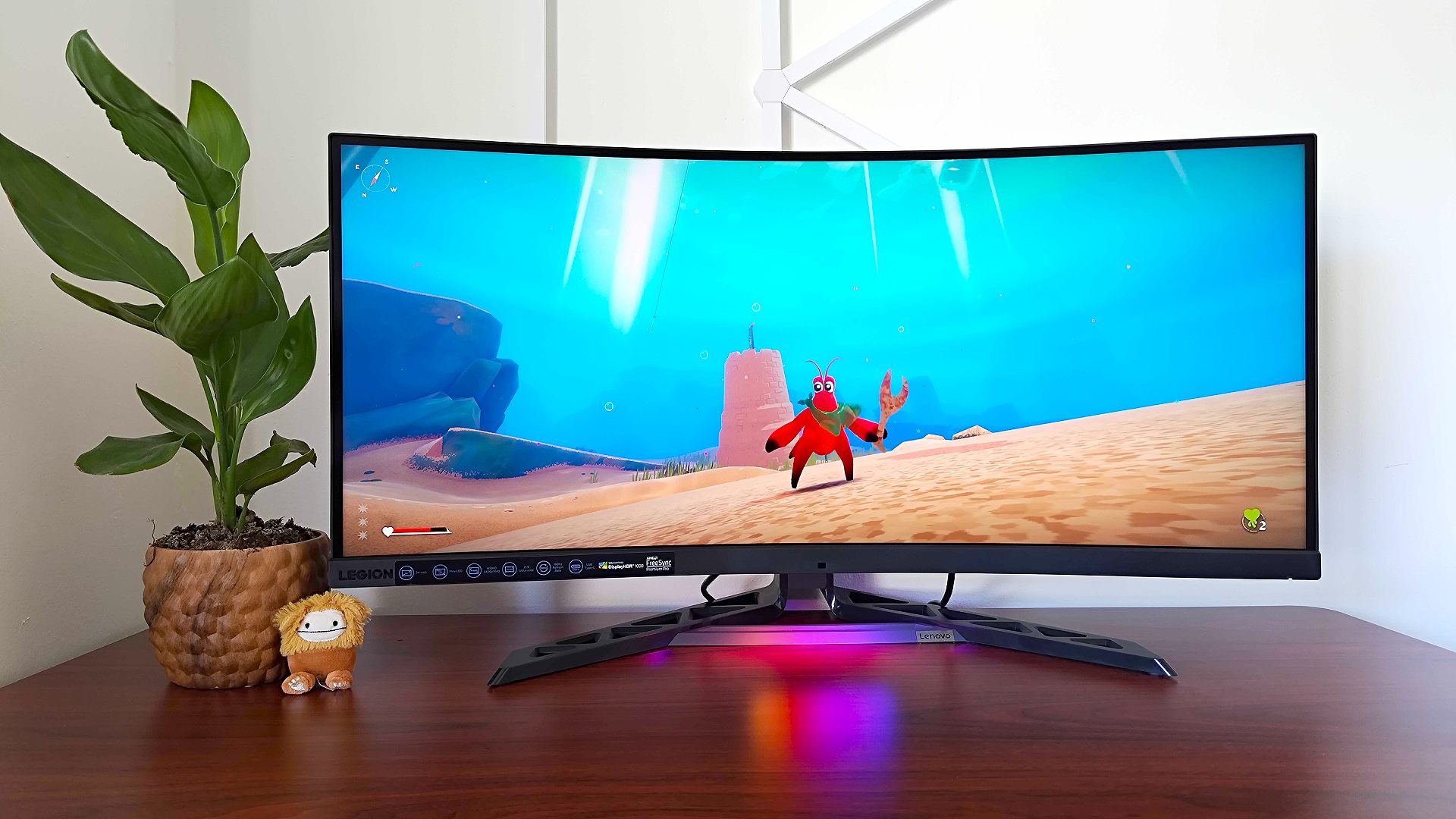
In a way, I feel a bit bad for the Lenovo Legion Y34wz-30. It boasts a great curved ultrawide mini LED panel that should serve as a nice OLED alternative, but its price ultimately prevents it from doing so. Taking a step back and looking at the current market, there are so many models that’ll boast better visuals than this screen sitting at the same price point, even though this one shows off what the panel tech can achieve.
Available for $1,199.99 / £899, the Lenovo Legion Y34wz-30 is running against the premium members of the best gaming monitors club. That’s inherently an issue, as while mini LED displays have a lot of qualities that make them worthwhile, you shouldn’t have to splash out the same price as a high-spec OLED to get one. Knock $400 off and I’d be singing a different tune, but you only need to swing by Amazon for a few seconds to see that it’s overpriced.
But hey, if the Y34wz-30 did cost under a grand, it’d certainly give OLED rivals a run for their money in a few different ways. I recently reviewed the Lenovo Legion R45w-30, and while both screens use a VA panel, the mini LED display produces far better colors than the larger WLED model. Depending on the kind of room you’re playing in, this panel might also hold up better thanks to its enhanced brightness capabilities, but I still wouldn’t recommend paying full price.
Specs
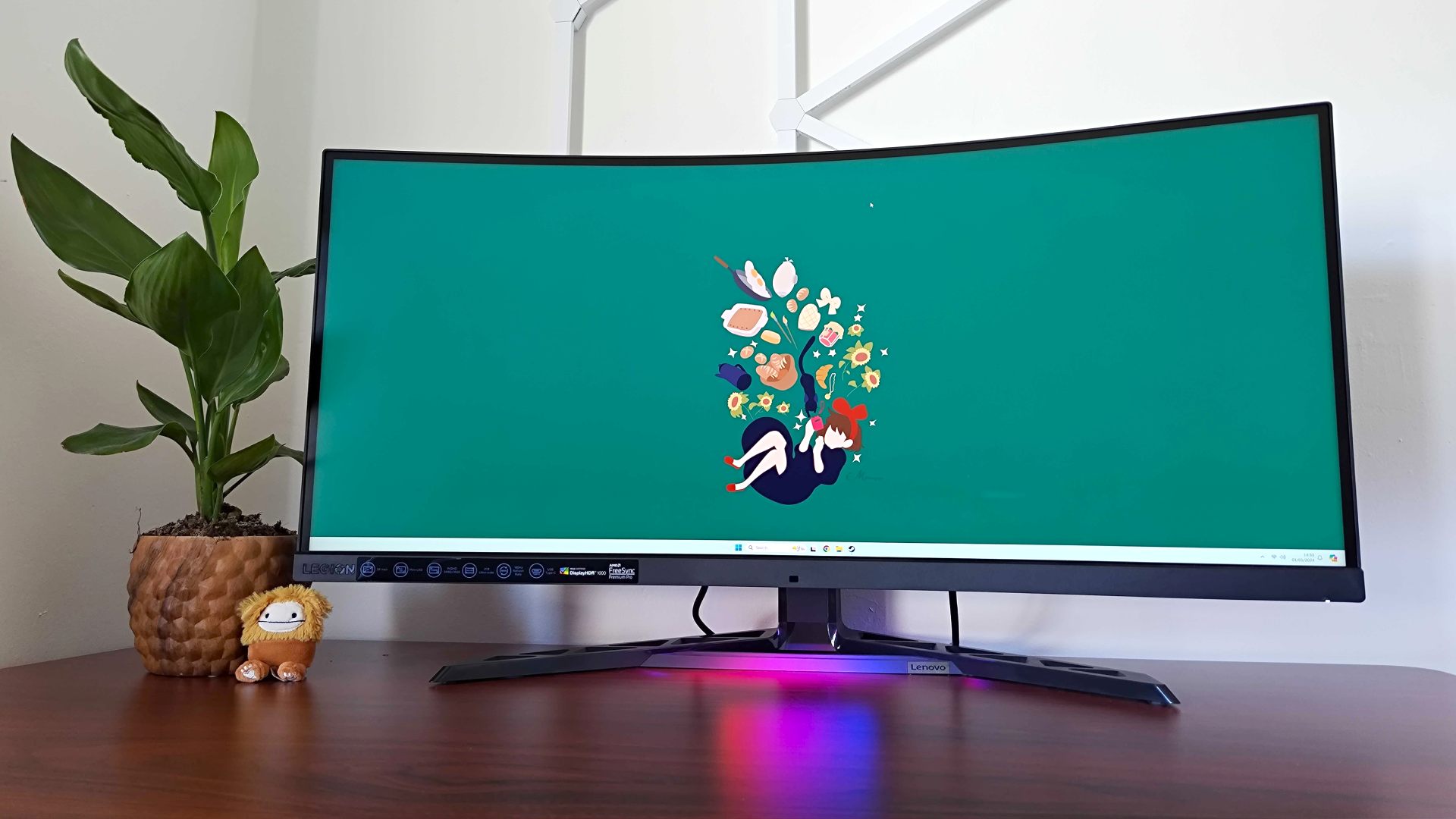
Armed with an ultrawide 34-inch curved 1440p VA panel running at 180Hz, the Lenovo Legion Y34wz-30 is what I’d consider a high refresh rate monitor. That bar is admittedly rising, with 60Hz feeling especially sluggish even when it comes to cheap screens, but I’d argue anything over 165Hz is still targeting FPS game fans.
Attached to the curvy screen speedster is a hearty array of ports, including two HDMI 2.1 ports, a single serving of DisplayPort 1.4, and a USB-C hub complete with KVM device switching. The latter has been present in almost every display I’ve tested this year, so I’m glad Lenovo has made the effort to jump on that particular bandwagon. You’re not going to really feel the benefits if you have a singular PC or plan to use the Y34wz-30 as a PS5 monitor, but those of you with a gaming handheld or laptop will be able to set aside your Steam Deck docks and standalone hubs.
Design
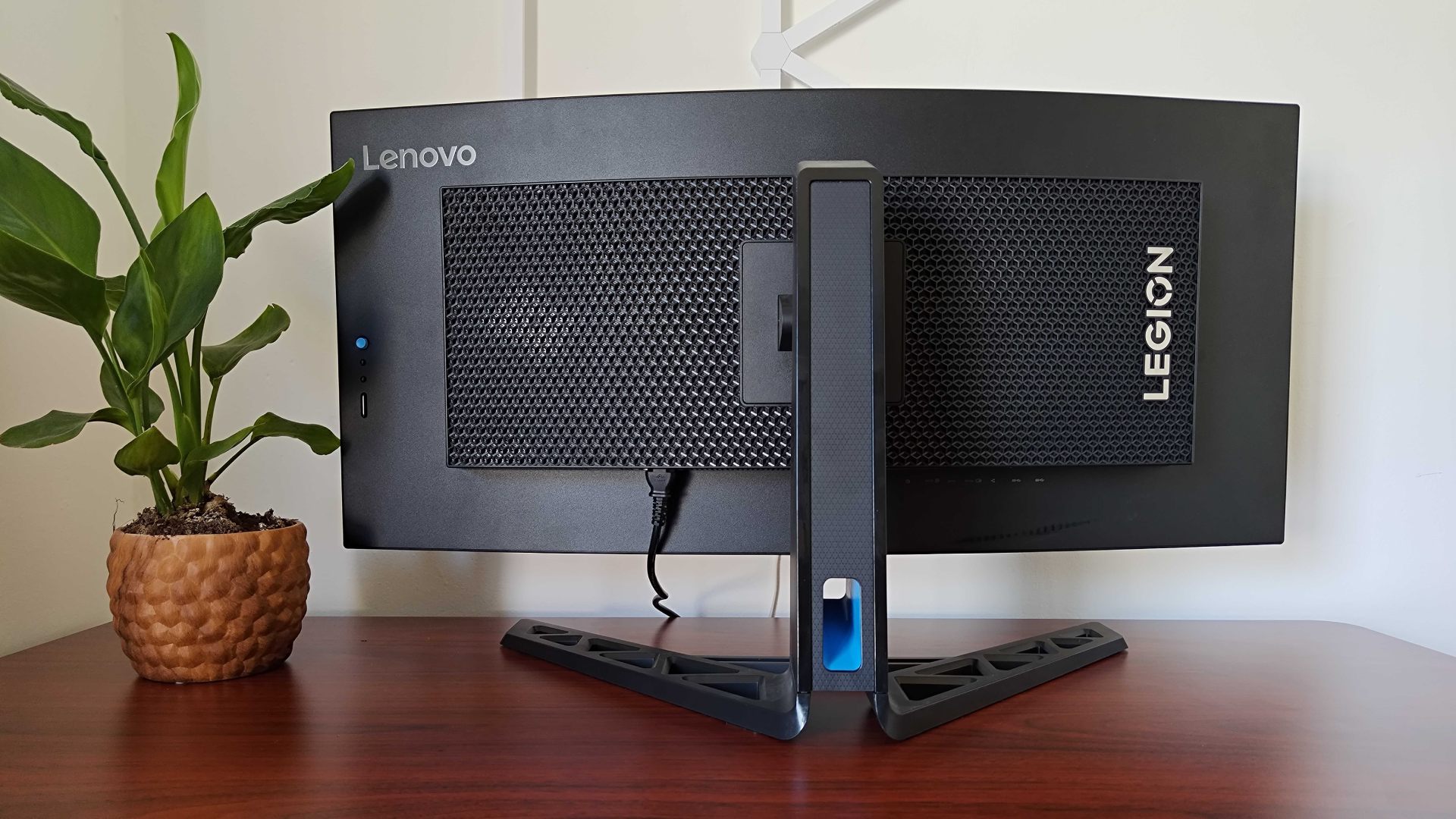
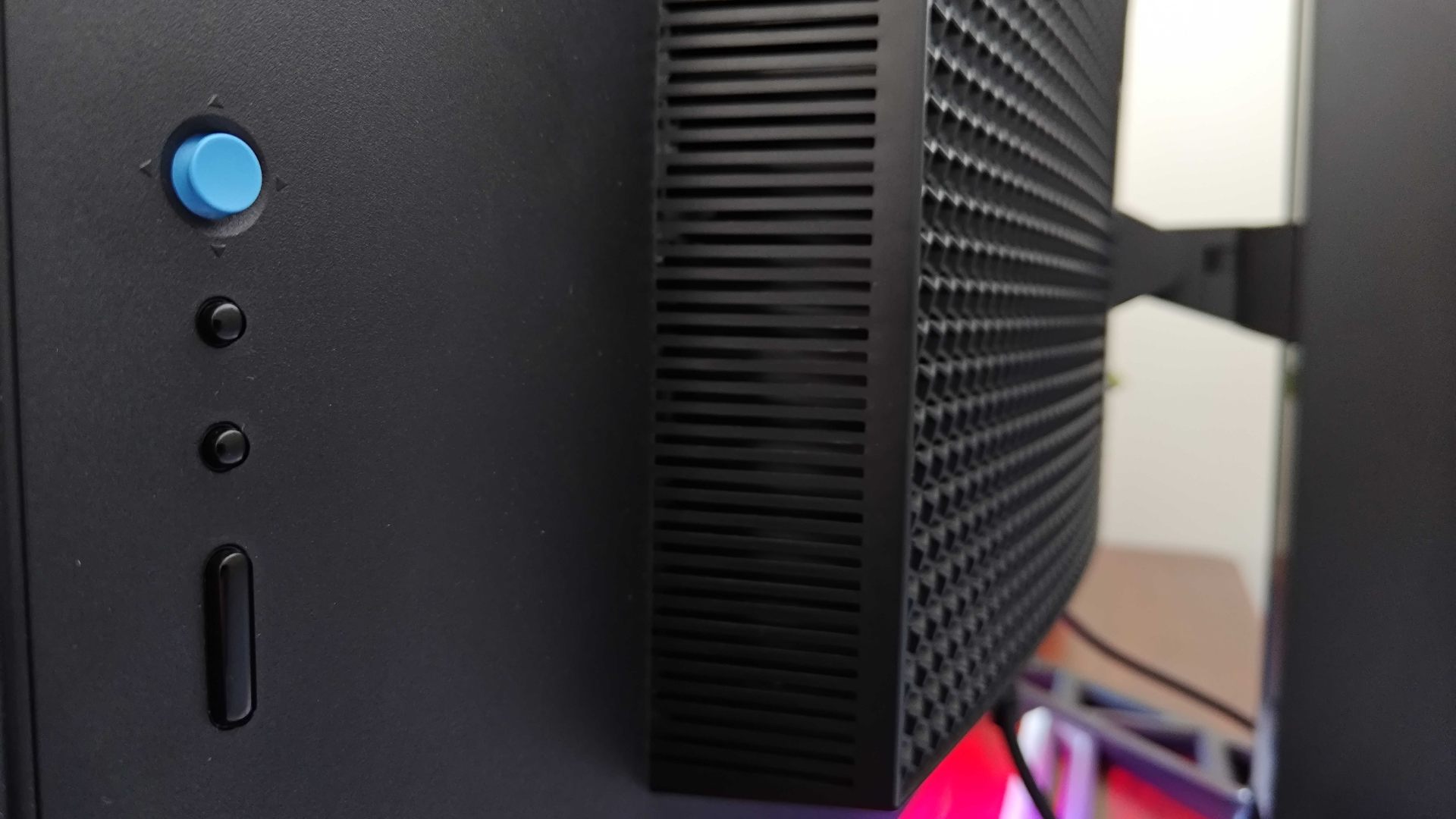
Immediately after unboxing the Y34wz-30, I could tell I was going to get along with its size better than with its 45-inch sibling. I’m sure some of you out there will be quite happy with the visor-like qualities of a 32:9 aspect ratio, but I’d much rather stick with a 21:9 model that takes up more vertical space. Is the former geared more towards productivity? Perhaps, but it’ll take a lot to convince me that long and skinny is a valuable gaming thing(y).
You can certainly tell the Legion Y34wz-30 is related to the R45w-30, with both featuring an industrial v-shaped pedestal stand that looks very warehouse chic. I don’t hate the look, but it’s absolutely one to avoid if you’re trying to manifest cozy vibes at your setup. Other than the fact this screen is far less upsetting width-wise, the only other noticeable difference is the fact this display wears some RGB, with a strip serving to illuminate the surface of your gaming desk.
The lighting strip adds a bit of flare to an otherwise standard-looking curved gaming monitor, but you’ll need to download Lenovo’s Artery software to wield control. As someone who has a million management apps already installed on my rig, it pains me to have to add another just to mess with some RGB patterns, but your tolerance for that may vary.
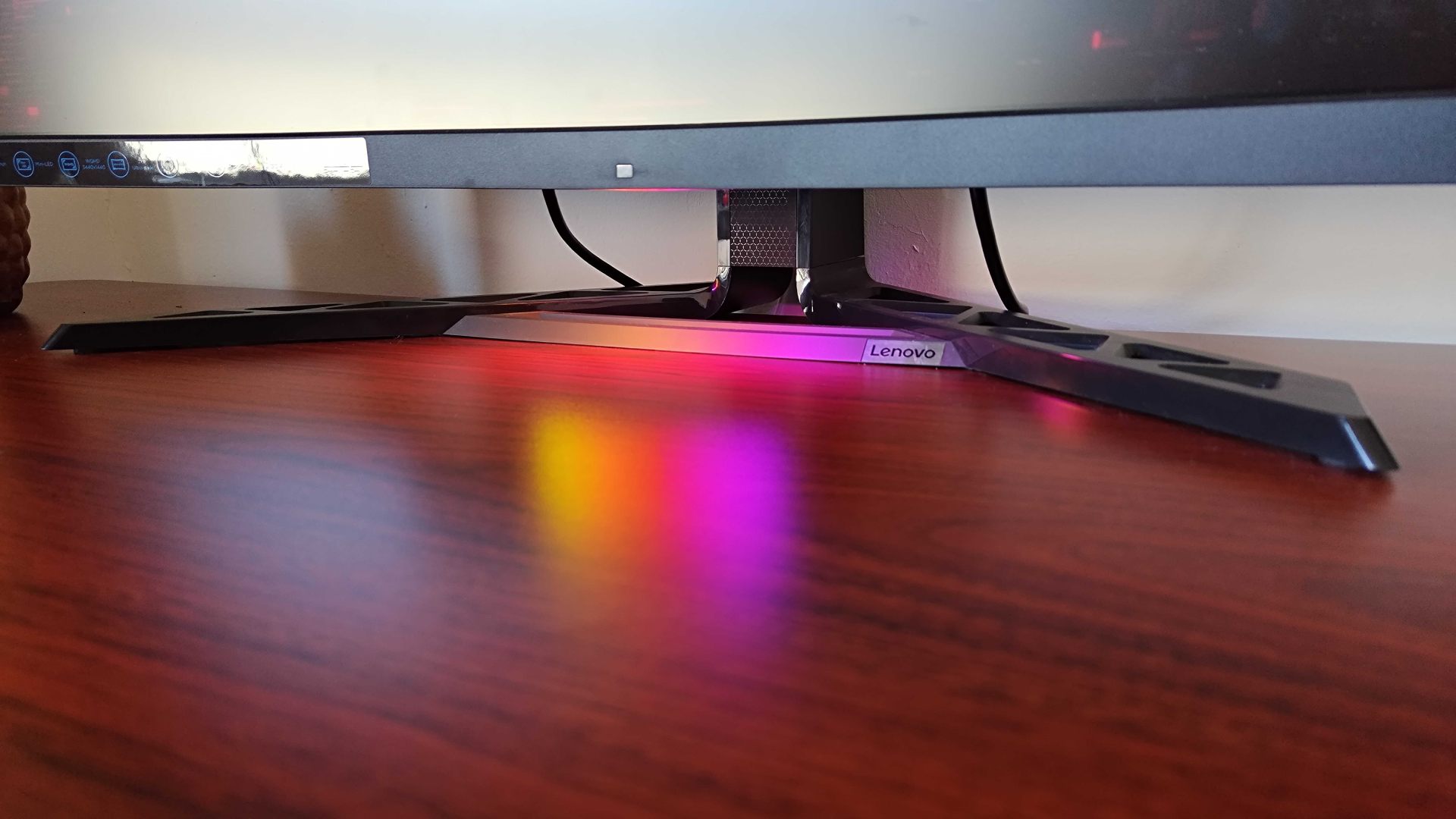
Things get a bit more interesting at the rear, as the back of the screen uses a 3D isometric cube pattern that looks like a big Q*bert level. It’s a nice touch, but something you’ll swiftly forget about if your screen is destined to face a wall. What might not leave your mind as quickly is this display’s weird lineup of OSD inputs, as Lenovo has paired the dreaded joystick nub with some extra buttons that don’t function as their design would suggest.
By that, I mean there’s a rocker that looks like it’d be for speaker volume but is instead two buttons for source input and power. This is actually the same setup as the larger 45-inch model, but since those were so out of reach, I didn’t catch on to how weird the match-up is during regular use. To dial back the volume, you’ll need to click horizontally on the joystick, with up and down doing completely nothing. I’m so perplexed by this that I’m not even going to bother going on my usual “every premium monitor should come with a remote” rant as if feels like we have bigger problems here.
As for port placement, you’ll have to reach under the back hump to hook everything up, but the recess isn’t too deep. I was able to easily swap out cables from my chair without too much faff, although I did have to take advantage of the screen’s height-adjustable stand since I keep my displays low to the desk.
Features
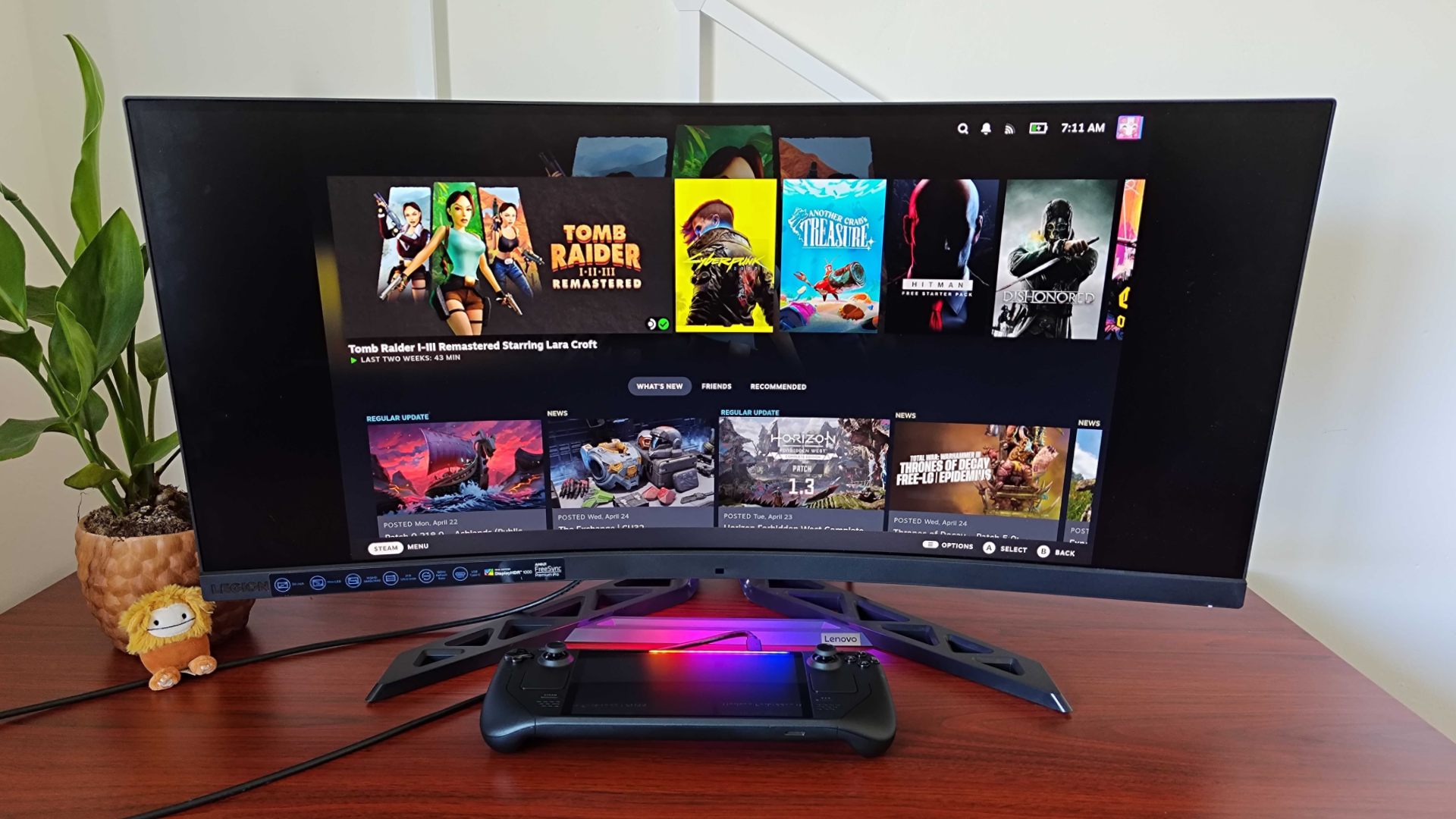
As far as feature sets go, the Legion Y34wz-30 packs enough useful utilities and extras to help its mini LED panel shine. Within the OSD, you’ll find the usual suspects, including color profiles and basic brightness dials, but there’s also a ‘Smart Light’ feature that’ll automatically adjust things to your environment.
I have mixed feelings about this feature, as things started off great, but I quickly discovered how sensitive the front sensor is just to me moving around. The outcome is an occasional flickering that is fairly noticeable, and it’s exactly the sort of thing that can personally trigger a migraine for me in the wrong conditions. That said, it’s incredibly useful when it works, especially since the weather in Scotland can rapidly change from sunny to battleship grey in a matter of moments.
Also stowed away within the OSD menu is a bunch of KVM abilities, with the same ‘True Split’ functions as the R45w-30 popping back up for a second round. Again, this caters more to productivity since it’ll split your single screen into two displays with access to peripherals, but I find it handy for messing around with the Steam Deck OLED while retaining quick access to my main rig. Even if you just use the USB-C connection for docking purposes, you’ll be able to keep the handheld juiced with 75W power delivery.
Performance
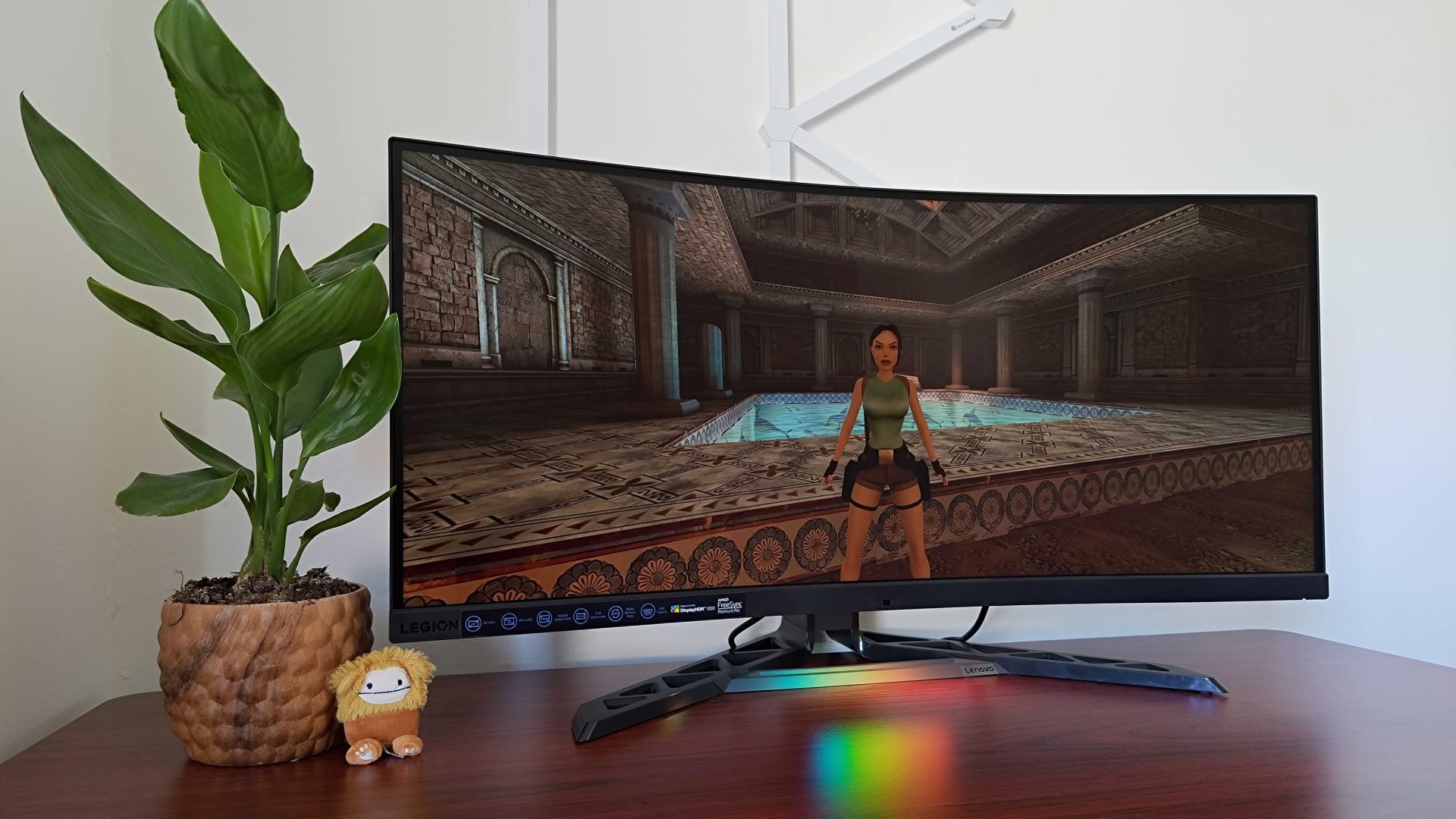
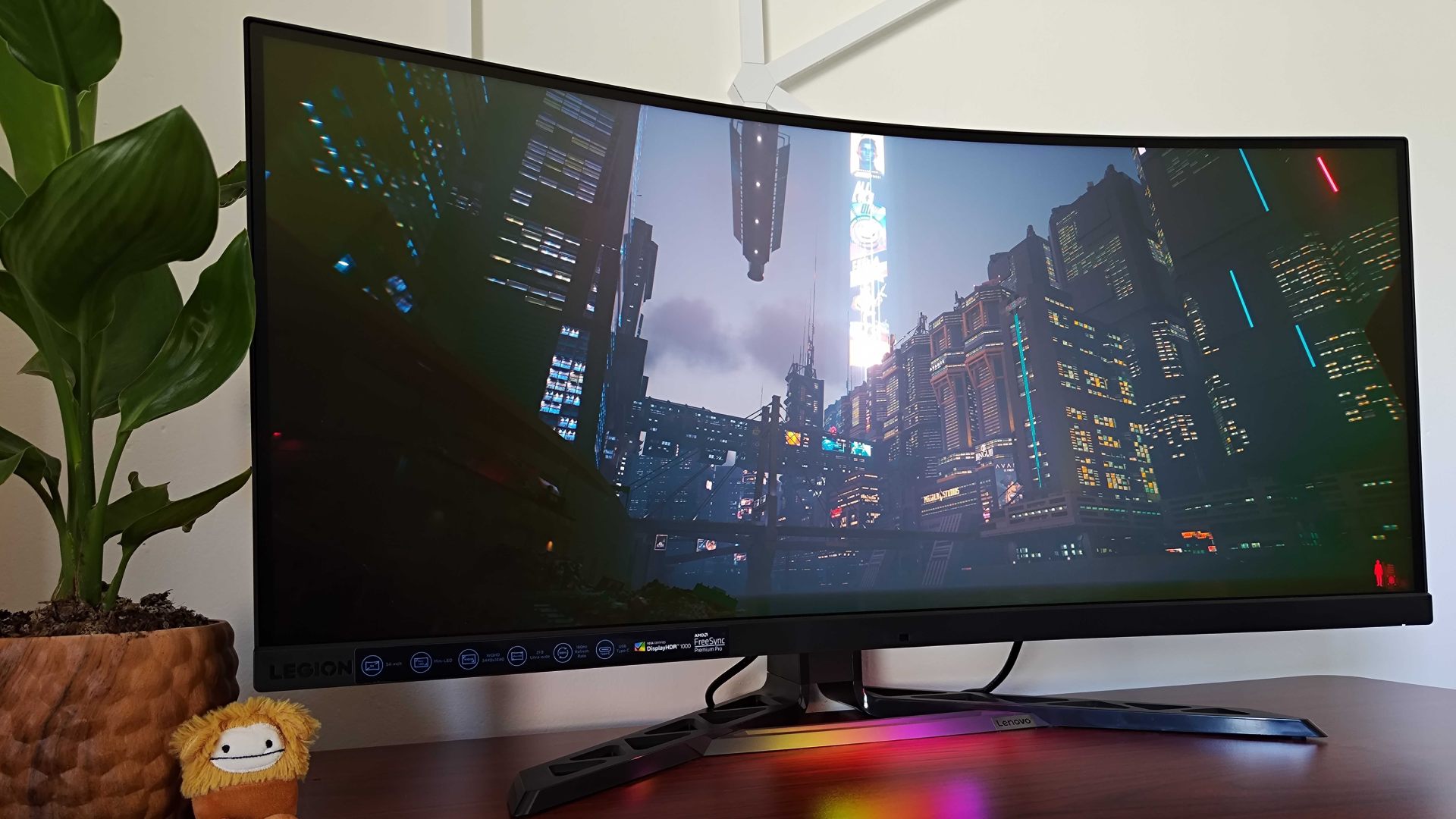
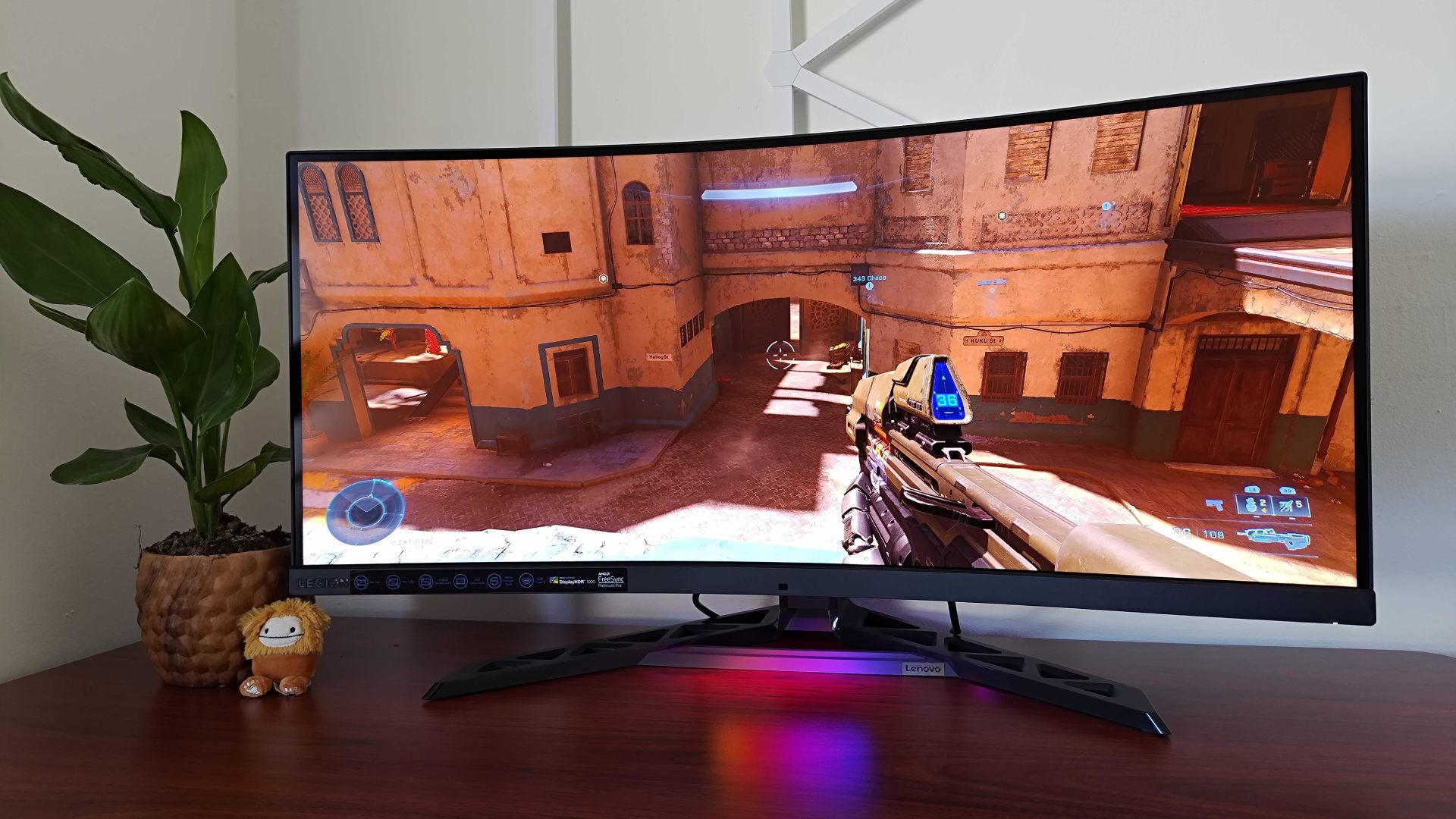
As for how the Y34wz-30 holds up visually, I was pretty happy with the experience this display provided. Colors are still not as vibrant as with an OLED panel, but they aren’t lacking by any means. Where this display absolutely stands out is with its HDR abilities, which are backed up by the enhanced brightness capabilities of mini LED tech.
I always take a trip to Night City to see how Cyberpunk 2077’s metropolis looks, and oh boy, the RPG really draws on those HDR abilities. Neon signs give off a realistic glare when within close proximity, and the gentle twinkle of every other light source makes the concrete jungle feel all too real. Not every display is able to pull off High Dynamic Range like this, so it’s definitely a strong reason to opt for Lenovo’s mini LED panel.
The vibrancy difference becomes more apparent when diving into the likes of Tomb Raider Remastered Trilogy, one of my go-to Steam Deck games. Compared to playing Lara’s big day out on Value’s 7-inch OLED, and even the KTC G27P6 I reviewed recently threw a much harder punch in terms of color. You could argue the less saturated look is a preference, but I’m a total sucker for sickly rich visuals.
Should you buy the Lenovo Legion Y34wz-30?
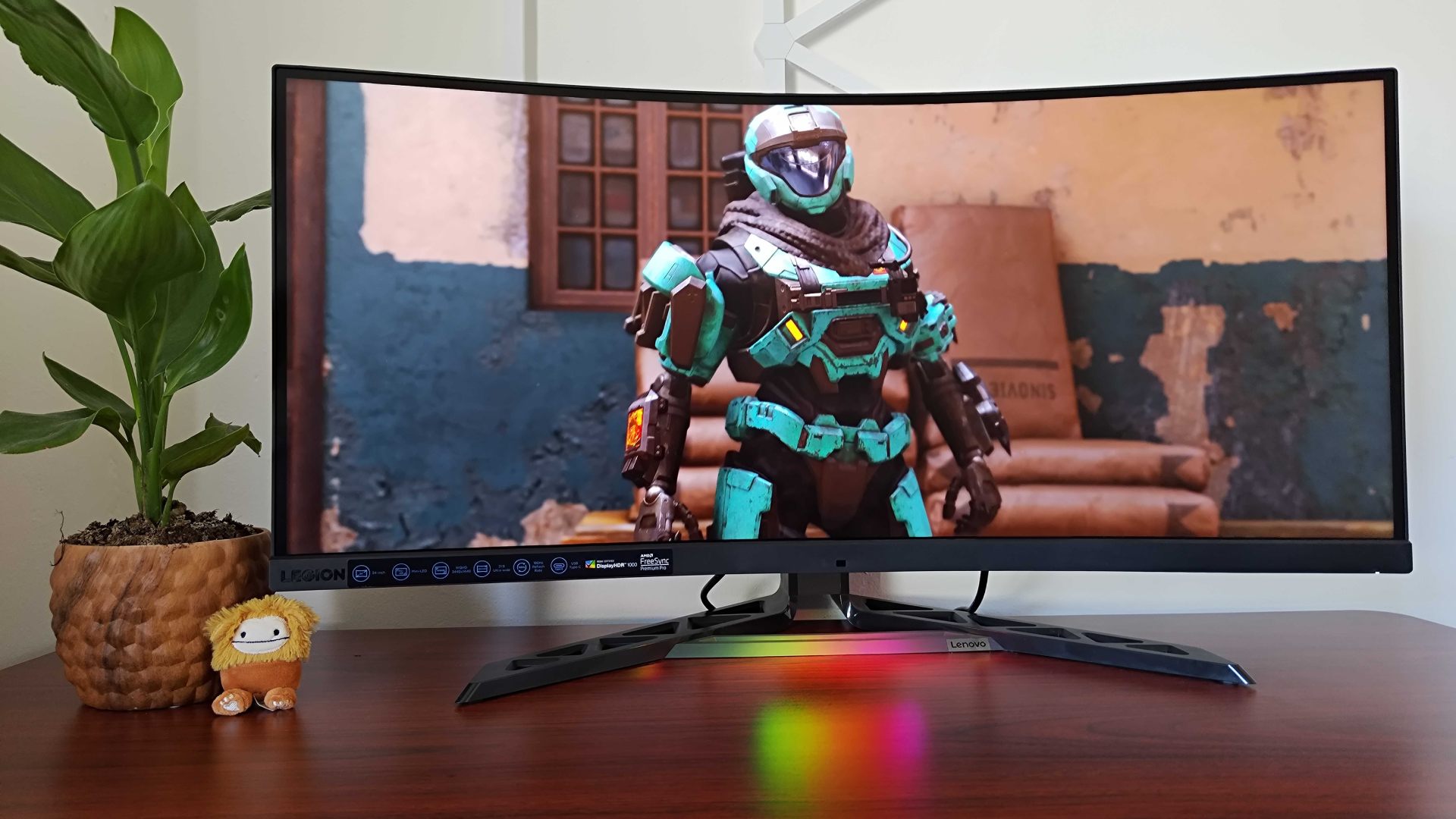
If you place MSRP aside, the Lenovo Legion Y34wz-30 is a great mini LED display that has superior brightness and HDR abilities on its side. Players who would rather invest in a curved ultrawide over one of the best 4K gaming monitors out there have a lot to gain from this screen, and it checks most of the boxes when it comes to speed and extra features.
Sadly, it is impossible to completely ignore Lenovo’s pricing for this panel, and it means I’d only recommend it if you’re getting a hefty discount. There’s every chance this screen will pop up for less, as it’s unlikely to survive on a battlefield of similar screens with OLED panels and fancier tech on their side. So, before slapping down money on this respectable ultrawide monitor, I’d strongly advise taking a wider look at what’s available and weighing up whether it’s good value.
How I tested the Lenovo Legion Y34wz-30
For two weeks, I used the Lenovo Legion Y34wz-30 as my main monitor for both productivity and playing games. During that time, I played a handful of games to assess the screen’s capabilities and performance, including Cyberpunk 2077, Tomb Raider Remastered Trilogy, Halo Infinite, and Another Crab’s Treasure. I also hooked up the Steam Deck OLED to the screen to test both its KVM and USB-C hub abilities.
For a full rundown of how we test monitors, swing by our GamesRadar+ Hardware Policy to learn more.
Looking for a wider selection of screens? Check out the best G-Sync monitors and best portable monitors for gaming. Alternatively, take a peek at the best gaming TV models if you need something even bigger.







